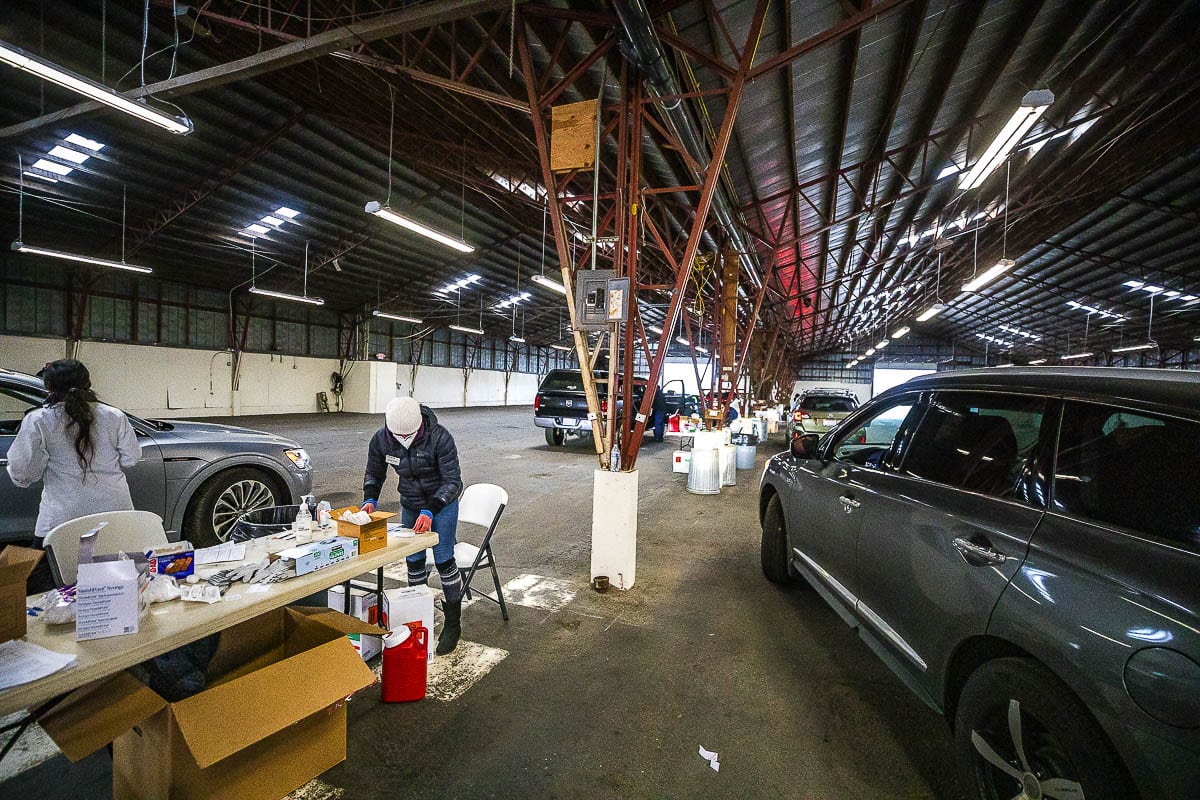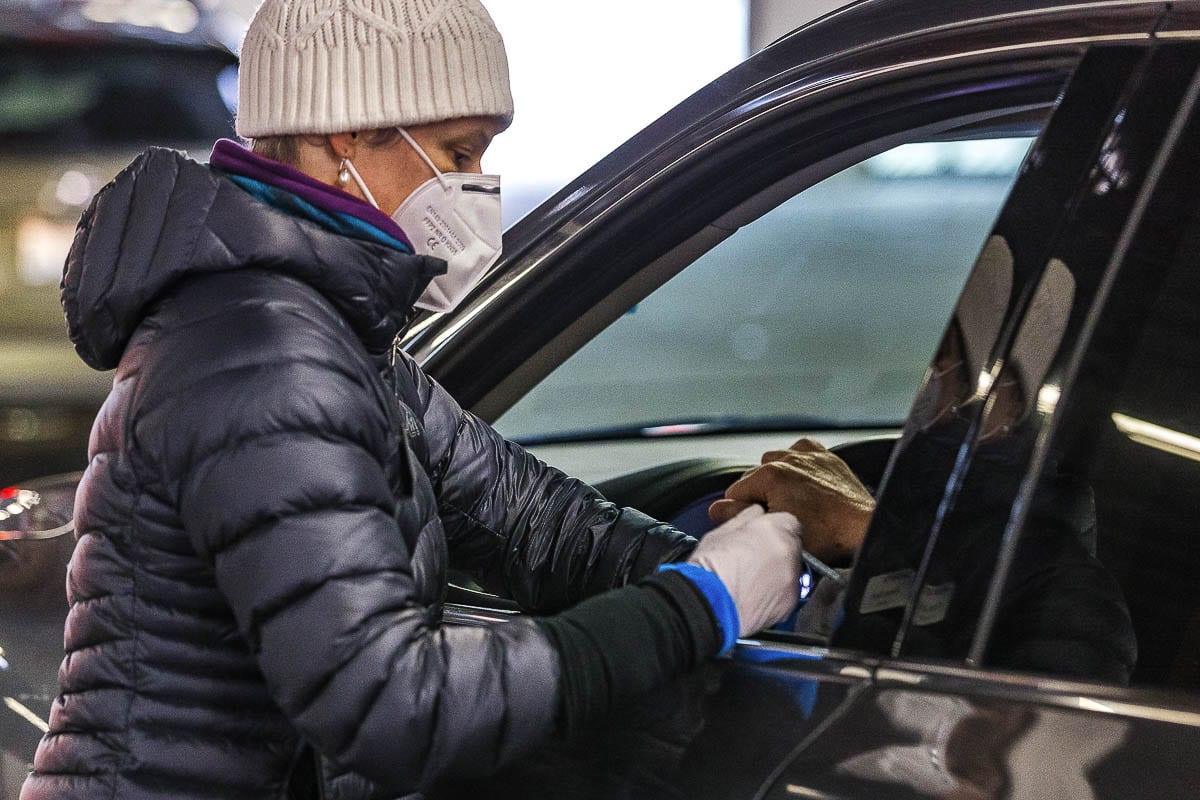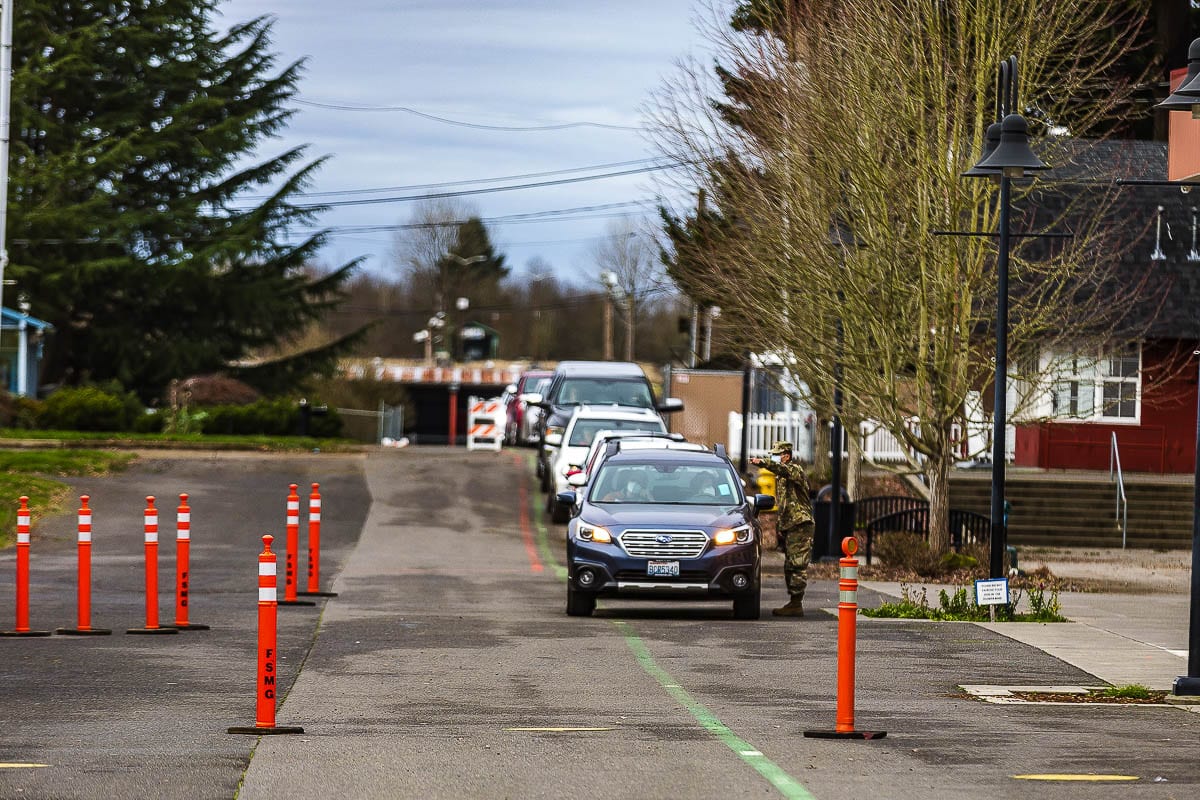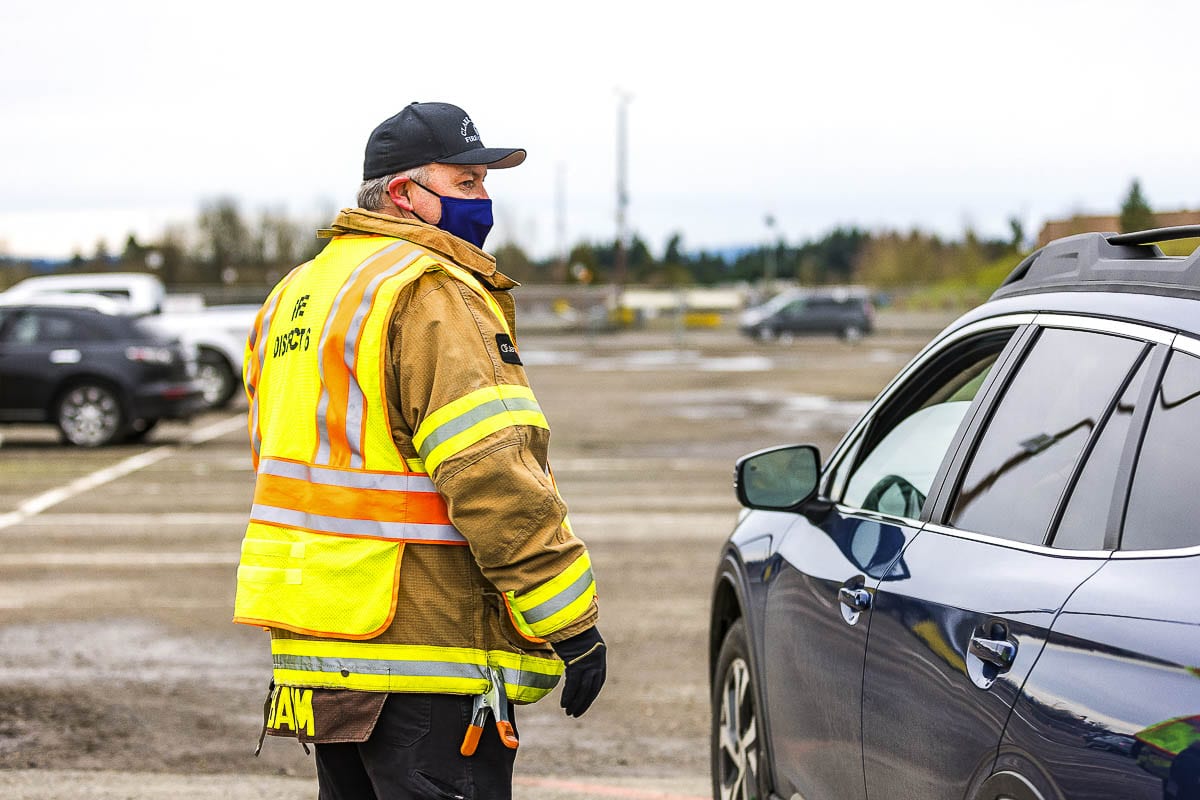Southwest Washington’s first mass vaccination site saw long lines, but a relatively smooth operation despite long lines of cars
RIDGEFIELD — Hundreds of cars lined up outside the Clark County Event Center at the Fairgrounds on Tuesday to be among the first to be vaccinated at Southwest Washington’s first mass vaccination site.
Opened under a joint effort between the Washington Department of Health, the National Guard, and the Albertsons/Safeway Pharmacy Operations, the clinic expected to vaccinate as many as 750 people each day this week.

Open Tuesdays through Fridays, 9 a.m. until 5 p.m., the vaccination site is available by appointment only. Anyone without an appointment who shows up will be turned away, the Department of Health said online.
Stephen Certo, pharmacy operations director for Safeway/Albertsons Portland division said they had 10 pharmacists helping administer vaccinations, along with one intern and a district manager on site.

“We’re just super proud to be here, it’s an honor,” said Certo. “These are the local people, and a lot of them probably shop at most of our stores, and it’s just an opportunity to help the public and the town get the vaccine.”
The 750 daily appointments is actually up from the 500 people DOH initially expected would be able to receive a vaccine at the site.
Outside, Clark County Fire District 6 paramedics greeted each person who had been vaccinated, directing them to a parking lot where they had to wait for 20-30 minutes to make sure there were no adverse reactions from the Pfizer-BioNTech vaccines being used.

Out of the millions who’ve received the vaccines, a small number have experienced severe allergic reactions, but early indications are that both the Pfizer and Moderna vaccines are exceptionally safe. Most people report just a sore arm on the first dose, with the second dose seeming to have a slightly higher incidence of fatigue, mild fever, or achiness.
Vaccine appointments filled up quickly for the week, and DOH said they expected no more slots would be available this week. However, Washington Gov. Jay Inslee said on Tuesday that the Biden administration had pledged to increase vaccine allotments by at least 16 percent starting next week.
That would increase the weekly shipment to Washington of both vaccines from around 100,000, to more than 116,000. Providers have also learned how to coax an additional dose from Pfizer vaccine bottles, making six instead of five, which represents a further 20 percent increase in supply.

On Monday, Inslee noted the number of daily vaccinations has increased from 16,000 last Thursday, to nearly 24,000 per day now. The state has set a goal of 45,000 daily vaccinations, but did not put a timeline on reaching the benchmark.
“We have taken action, we expanded our distribution and infrastructure and it is working,” Inslee said Monday. “We still have a long way to go, but if Washingtonians have proven anything throughout this pandemic, it is that we are up to the task. We have taken action, and we will continue to improve until we meet and exceed our goals.”

Hospitals worry about supply
The possible fly in the ointment came courtesy of the Washington State Hospital Association (WSHA), which said Monday that they are seeing vaccine shipments drying up at their clinics, potentially so the state can provide sufficient supply at the mass vaccination sites around the state.
“Our preference would be that, as the vaccine supply increases, that we think about giving vaccines at the same level to the providers,” said WSHA president Cassie Sauer, “who are demonstrating that they can get it out. The folks who’ve been doing it already.”
Several rural hospitals said they have seen their vaccina allotments dropping, meaning that residents who might have otherwise been able to come into a nearby clinic to get vaccinated now have to go through another reservation system, and then drive a long distance to get a dose at a mass vaccination site.
There also continue to be complaints raised by hospitals that the state’s system for reporting vaccine usage is clunky, time consuming, and often glitchy, making it appear as if more doses are available than there actually are.
“Once the governor said ‘yes, you can go to (Phase) B1, we opened our doors and have had plenty of people,” Sauer said. “So we’ve gotten through ours.”
There are also concerns about people who qualify being asked to register on multiple waitlists. In Clark County, nearly 20,000 people signed up through the Public Health website to be notified when a provider has vaccines available, but many also made appointments through the state’s portal for the mass vaccination site.
“One worry that we do have is, if people are scheduling multiple appointments, because they’re worried about their appointment being cancelled, and then don’t show up,” said Sauer. “And that has not been happening yet. But we’re worried about it in the future.”
A large part of that concern is the limited lifespan of the vaccines once they are thawed out. Especially with the Pfizer version, the thawing process has to happen well in advance, and if someone fails to show up for an appointment, their dose may end up going to waste.
Most hospitals have taken to creating waitlists of people who either live or work nearby a clinic, which they can call if an appointment fails to show. That has helped to greatly reduce the number of wasted doses.
There has also been confusion over keeping track of first and second doses, or making sure supply is sufficient to make sure people who’ve gotten a first dose can be scheduled for a second one within the timeframe.
The Centers for Disease Control now says that getting your second dose within six weeks should be sufficient to provide protection from the virus, but in general Pfizer recommends a second dose of their vaccine within three weeks, versus 28 days for the Moderna version.
Washington state also now requires that providers use at least 95 percent of their vaccine shipment within seven days of receipt, raising concerns that a supply shortage could make it difficult to have sufficient supply when people return for their second dose.
“I’m hoping that they’ll all come and we’ll be fine,” said Sauer. “But there is a lot of worry about it. We’ve got to get those second doses set in the time that’s prescribed.”
In his press conference on Tuesday, Gov. Inslee said the Biden administration had assured the states that there would be greater communication about vaccine allotments, and more assurances on when they would be arriving.
Hospitals say that information would be hugely helpful in allowing them to have greater confidence when scheduling people that the vaccines will be there.
One final concern is that the state and other providers are generally only asking people registering online to certify that they qualify for a vaccine, though some providers are finding that not everyone is honest when filling out the application.
“If we dare question them, and they’re not eligible, it’s a very bad conversation,” said Rosalinda Kibby, an administrator at Columbia Basin Hospital in Ephrata. “They are irate and difficult for staff to deal with.”
It remains to be seen how the state might work to crack down on anyone abusing the system, though it doesn’t seem to be a widespread problem.
Ultimately, Inslee said the overwhelming demand for vaccinations is a good thing, indicating that a majority of people are ready and willing to get a dose when it’s available.




